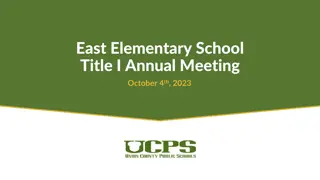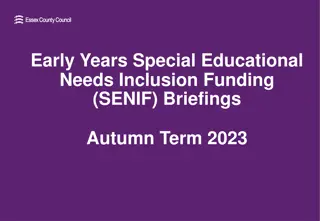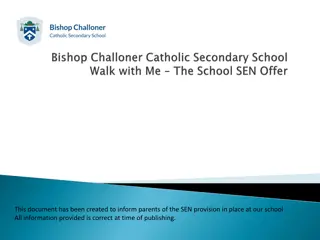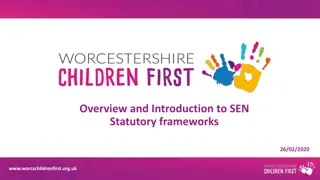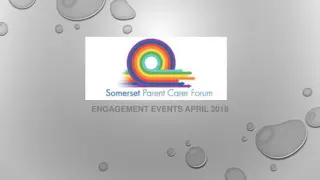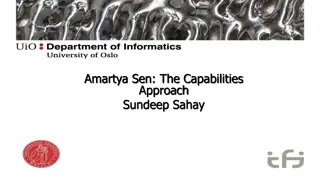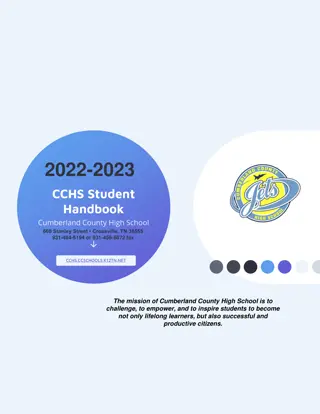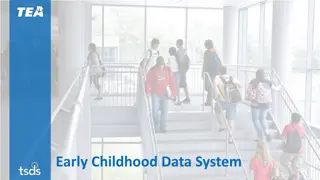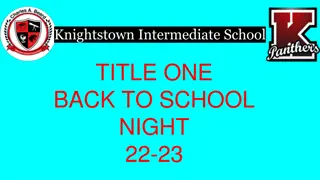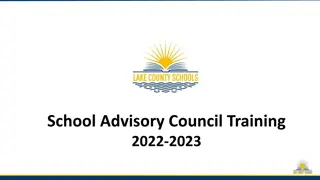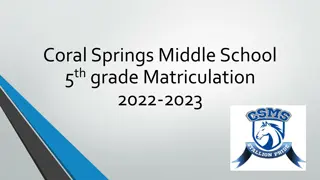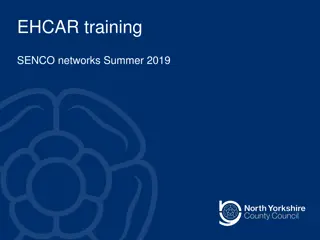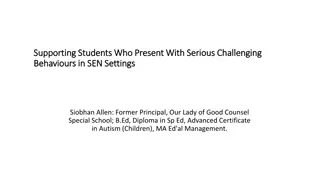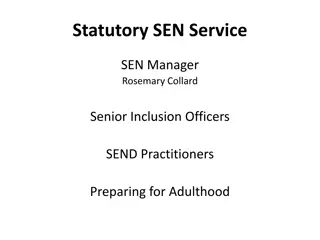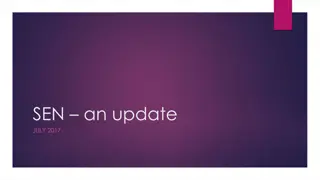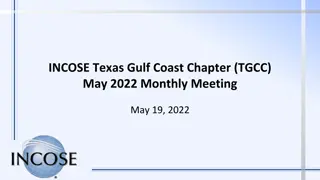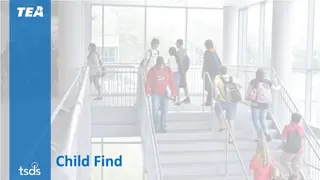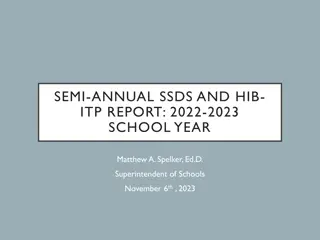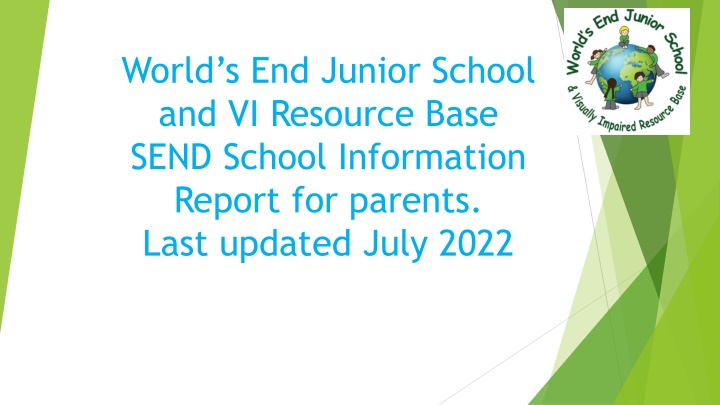
Supporting Children with Special Educational Needs at Worlds End Junior School
Discover how Worlds End Junior School provides tailored support for children with special educational needs through a variety of programs and resources. From communication and interaction to sensory and physical needs, learn about the inclusive approach to education at this school. Contact the special needs coordinator for more information.
Download Presentation

Please find below an Image/Link to download the presentation.
The content on the website is provided AS IS for your information and personal use only. It may not be sold, licensed, or shared on other websites without obtaining consent from the author. If you encounter any issues during the download, it is possible that the publisher has removed the file from their server.
You are allowed to download the files provided on this website for personal or commercial use, subject to the condition that they are used lawfully. All files are the property of their respective owners.
The content on the website is provided AS IS for your information and personal use only. It may not be sold, licensed, or shared on other websites without obtaining consent from the author.
E N D
Presentation Transcript
Worlds End Junior School and VI Resource Base SEND School Information Report for parents. Last updated July 2022
What are our values and aims? At Worlds End Junior School we believe that every child is unique and should be valued as an individual. Some of our children may need more support to access school life and there are a number of ways that we try to achieve this. Our school information report aims to support parents in understanding how we meet the needs of our children with SEN. This forms part of Birmingham s local offer which can be found at https://www.localofferbirmingham.co.uk/ Our school special needs co-ordinator is Caroline Barlow. Her role is to oversee all provision for our children with additional needs. She can be contacted via dojo, email c.barlow@worldsendjunior.bham.sch.uk or an appointment can be made via the school office.
What types of SEN are provided for at Worlds End Junior School? Our school currently provides additional and/or different provision for a range of needs, including: Communication and interaction, for example autistic spectrum disorder, Asperger s Syndrome, speech and language difficulties Cognition and learning, for example, dyslexia, dyspraxia, specific maths difficulties Sensory and or physical needs, for example, visual impairments, hearing impairments, processing difficulties, epilepsy. Social, emotional and mental health difficulties, for example attention deficit hyperactivity disorder (ADHD) Moderate/severe/profound and multiple learning difficulties.
Worlds End Resource Base for Children with Visual Impairment Provision Each child receives in-class support from the QTVI and a teaching assistant according to his/her needs. Support time allocated for each child can vary and is reviewed regularly with class teachers. At World s End Resource Base, we adhere strongly to the principle that our pupils with visual impairment share a common entitlement to a broad and balanced curriculum, including the National Curriculum, alongside their fully sighted peers. Our resource base lead and QTVI (qualified teacher of visual impairment) from September 2022 will be Gill Chambers. Further information can be obtained by contacting the school office.
Worlds End Resource Base for Children with Visual Impairment Our Resource Base is staffed by an experienced team coordinated by a Qualified Teacher of Visual Impairment (QTVI) and Teaching Assistants who specialise in working with children with visual impairment. We have particular expertise in educating children who are tactile learners. All children are fully part of their class and spend most of their time being taught by the class teacher, supported by their specialist VI teaching assistant to ensure pupils are given full access to all areas of the curriculum. They are also supported in developing additional skills such as Braille, mobility and Independent Living Skills. In addition, their peers develop awareness and understanding of the specific skills pupils with visual impairment need in order to participate fully in school life. Admission Arrangements Worlds End is the only Primary VI resource in the city and therefore is able to take pupils from across Birmingham. Pupils from other Local Authorities can also be considered. Applications for admissions are supported by the Birmingham Sensory Support team, assessed by the city-wide Sensory panel and processed by SENAR. Pupils should have an EHCP, showing visual impairment as their main need to be considered for a placement. Pupils have IEP and Annual Reviews in accordance with the statutory requirement of their EHCP.
How do we identify if a child has Special Educational needs There can be many reasons for learners not making expected progress. These may include absences, attending different schools, difficulties with speaking English, or worries that distract them from learning. The school understands that children who experience these barriers to learning are vulnerable and may need extra support to help them achieve. This does not mean that all vulnerable learners have SEND. Only those with difficulty that requires special educational provision will be identified as having SEND. At different times in their school life, a child or young person may have a special educational need. The Code of Practice 2015 defines SEN as follows: A child or young person has SEN if they have a learning difficulty or disability which calls for special education provision to be made for him or her. A child of compulsory school age or a young person has a learning difficulty or disability if he or she: a) Has a significantly greater difficulty in learning that the majority of others the same age, or b) Has a disability which prevents or hinders him or her from making use of facilities of a kind generally provided for others of the same age in mainstream schools or mainstream post-16 institutions. Where pupils progress is significantly slower than that of their peers, or fails to match their previous rate of progress, despite high quality teaching targeted at specific areas of difficulty, it may be that the child has SEN. Information will be gathered, including seeking the views of parents and the pupil, as well as from teachers and assessments. Concerns may also be raised through: Liaison with Infant school/previous school Discussions raised by parents/ carers Liaison with external agencies eg for a physical/medical need A health diagnosis through their paediatrician
What happen if there are concerns my child may have special educational needs? As soon as any concern is raised about a child parents will be contacted to discuss this. We then follow the graduated approach and the assess, plan, do, review model as stated in the Code of practice 2015. This can be found at https://www.gov.uk/government/publications/send-code-of- practice-0-to-25 Once a concern has been raised and parents informed children are placed on the concern section of the sen register. The class teacher and SENCo monitor the pupil carefully and ensure that quality first teaching strategies are in place. Mrs Barlow observes the pupil, looks at their work and gaps are identified. If concerns continue then the child moves to the monitoring section of the SEN register, parents are informed. The child is assessed using the Birmingham continuum which measures small steps progress. Interventions and classroom provision is tailored to meet the pupil s needs. If concerns continue the child will be placed on the SEN register, specialist agencies may be involved and further interventions and support will be put into place.
How do I raise concerns if I need to? At World s End Junior School we pride ourselves on building positive relationships with parents and carers. We encourage an open and honest relationship whereby we can develop quality support for your child. If you would like to raise a concern please either discuss your concern with your child s class teacher, our pastoral team or our Special Educational Needs Coordinator (SENCO) Mrs Caroline Barlow. These should be raised via the school office. Our complaints procedure can be found on our school website.
How will school support my child? The SENCO oversees all support and progress of any child requiring additional support across school. Support may be universal, targeted or specialist depending on the need of the child . The class teacher will oversee, plan and work with each child with SEN in their class to ensure that progress is made. Universal provision-Universal provision in schools and settings is what is in place for all pupils to enable them to make expected progress. Targeted provision-Targeted support is additional, time-limited, tailored intervention support programmes. Targeted support can be for any area of difficulty, including literacy, numeracy and behaviour. Pupils receiving targeted support do not necessarily have SEND. Universal support remains in place. Specialist provision- Specialist support refers to increasingly individualised SEND programmes. Additional adults may support your child in your school, this may be in class, small groups or 1:1 interventions. We aim to withdraw children as little as possible from class to ensure that all children have access to learning from the most qualified person-their teacher. When additional equipment or support is needed this is looked at on an individual basis and matched to the needs of the children.
How will the curriculum be matched to my childs needs? Our curriculum is designed to be inclusive and to allow all learners to engage in all activities. We aim to give children a range of learning opportunities and styles so that they can find the areas that they can excel in. All work within class is pitched at an appropriate level so that all children are able to access according to their specific needs. This may be in the form of differentiated activities, extra resources, pre teaching, extra modelling and scaffolding. Some children may require more personalised curriculums which will be agreed with the SENCO, parents, teachers and outside agencies. We make reasonable adjustments for all pupils, including disabled pupils to ensure that children with SEN or a disability are able to access all aspects of school life. We do this by planning and risk accessing any curriculum and non curriculum activities to ensure they are accessible to all and adjustments are made when needed. Our accessibility policy is available on our school website. Our admission policy is based on upon the agreed Birmingham City Council admissions policy. Normal admission arrangements will be followed for pupils with SEN or Disabilities When children with disabilities join our school we work closely with parents and any professionals involved to ensure disabled pupils can access our school.
How do we adapt the curriculum and learning environment to meet the needs of our Sen children? We make the following adaptations to ensure all our pupils needs are met: Differentiating our curriculum to ensure all pupils have access to it, by grouping, 1:1 work, teaching style, adapting content of the lesson. Adapting our resources and staffing. Using recommended aids, such as laptops, assistive technology, larger font, coloured overlays, reading pens. Differentiating our teaching, for example giving longer processing times, pre-teaching of key vocabulary, reading instructions outload etc Following advice from outside agencies and specialists.
How will I know how my child is doing and how will you help me to support my childs learning? We offer an open door policy where you are welcome any time to make an appointment to meet either the class teacher or the SENCO and discuss how your child is getting on. We can also offer advice and practical ways you can help your child at home. We believe that your child s education should be a partnership between home and school, therefore we aim to keep communication channels open and communicate regularly, especially if your child has complex needs. If your child is on our SEN register they will have a pupil profile which will outline individual pupil information and learning targets. You will be invited in to school on a termly basis for a pupil centred review meeting where we will discuss the needs and progress of your child. These meetings ensure that everyone develops a good understanding of the pupil s areas of strength and difficulty, parents concerns are taken into account and that everyone understands the agreed outcomes and next steps for the pupil. Any reports from outside agencies will be sent home and you will be invited into school to discuss these reports.
How does the school know how well my child is doing? As a school we measure children s progress in learning against National expectations and age related expectations. For children who are making small step progress we use the Birmingham continuums. These are small steps targets broken down into bands which match the national curriculum. Your child s progress on these will be shared with you at our review meetings. The class teacher continually assesses each child and notes areas where they are improving and where further support is needed. Children who are not making expected progress are identified through pupil progress meetings with the class teacher, Deputy /Head teacher/ Phase leader and the SENCO. In this meeting a discussion takes place concerning which children are experiencing difficulty and what further support can be put in place. If your child is discussed at one of these meetings you will be informed. When the child s pupil profile is reviewed comments are made against each target to show the progress the child has made.
What support will there be for my childs overall well being? We are very proud of the pastoral support we provide for all the pupils and families at our school. We have a dedicated and highly skilled team ready to help and encourage pupils and families who wish to discuss any problems or request extra support. This can range from friendship issues, attendance, family breakdowns, bereavements or any emotional difficulties that arise during the course of the year. Our vision is to ensure that all children feel safe and happy in our school and to help them overcome any barriers to learning they may have. We are here to ensure all children receive their potential and are prepared for life. Our pastoral team staff are: Mrs Barlow, pastoral lead Mrs Taylor, pastoral manager Mr Carey, assistant learning mentor Mrs Wood, assistant learning mentor If you have any concerns about your child and wish to contact the pastoral team they can be contacted via dojo or the school office.
How will my child be able to contribute their views? At World s End Junior school we value and celebrate each child being able to express their views on all aspects of school life. This is usually carried out through the School Council which has an open forum for any issues or viewpoints to be raised. Children who have pupil profiles discuss and set their targets with their class teacher/SENCO. There is termly pupil voice questionnaire where we actively seek the viewpoints of children especially concerning their targets and progress. Children are encouraged to self assess and share their views during lessons and interventions.
What specialist services and expertise are available at or accessed by the school? Mrs Barlow is a fully qualified teacher who has taught in a range of schools and areas since 2003. She holds the national Senco qualification and has 7 years experience in the role of senco. She is also our pastoral lead. Mrs Barlow is non class based and works 3 days a week. All our teachers and support staff are given regular training throughout the year. Any new staff are given a full induction and SEN training. We have a team of dedicated teaching assistants with many years experience. ALL Tas have a level 3 teaching assistant qualification. Mrs Karra is our Speech and Language specialist and Mrs Pandit is our Autism Lead practitioner. We have a speech and language therapist who come into school one afternoon a week to work with our children with communication and interaction difficulties. We work with a range of outside agencies including: Pupil School Support, Educational Phycologists, Occupational therapists, communication and autism team.
What is the schools approach to supporting children in transition periods? Worlds End Junior School recognises the importance of effective transition and has a number of strategies to support children. Regular and extra visits to new classrooms/ settings. 1:1/small group transition sessions. Contact with staff/senco from previous/ new settings. Transition meetings for staff to discuss needs of individual children. Transition sessions with parents to meet new members of staff. Transition booklets. Transition sessions in PSHE lessons Personalised transition programmes when needed. Pupil profiles and essential information passed on to next teacher/setting.
How does the school evaluate effectiveness of its provision? We evaluate the effectiveness of provision for pupils with SEN by: Regularly reviewing pupil s individual progress towards their targets on a half termly basis. Reviewing the impact of interventions at regular intervals Gathering parents and pupil voice Working closely with local sencos Working closely with outside agencies Monitoring of books, lessons, data by SENCO Evaluating the school sen action plan Using provision maps to measure progress Holding termly meetings with class teachers and parents Annual reviews for pupils with EHC plans
Who can I contact for further information? First point of contact would be your child s class teacher to share your concerns. You could also arrange to meet Mrs Barlow, our SENCO. Contact our pastoral team Look at the SEN policy on our website . Birmingham Guidance https://www.localofferbirmingham.co.uk/ A copy of our complaints procedure can be found on our website.
Who can I contact for further information? The Birmingham Special Educational Needs & Disability Information, Advice and Support Service (SENDIASS) offers impartial information, advice and support to children and young people with special educational needs or disabilities. The service is impartial, confidential, and free. If you're a parent or young person being assessed, the service can: Help you to understand the referral process Act as a named contact throughout the process Help you to communicate with everyone involved in the assessment process Provide information about personal budgets Put you in touch with other people who can help, if necessary. Information Advice and Support Service Special Educational Needs and Disability Information Advice and Support Service Opening hours: 8:45am to 5pm, Monday to Friday. Lancaster Circus PO Box 16289 Birmingham B2 2XN Telephone: 0121 303 5004 Email: sendiass@birmingham.gov.uk


